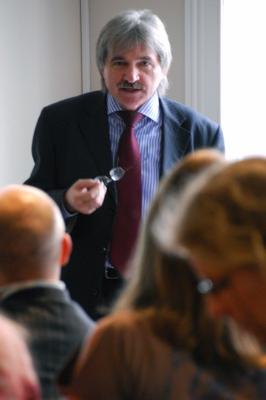
Arctic Frontiers: Disinformation, Security and the Northern Sea Route
Bellona held a seminar on countering Russian disinformation in the Arctic at the Arctic Frontiers international conference in Norway
News

Publish date: October 8, 2006
Written by: Charles Digges
News
So said Bellona’s Alexander Nikitin and other experts at a Bellona-hosted seminar on Friday convened to discuss the problems of Russia’s newly adopted legislation on civil society and non-governmental organisations (NGOs).
The official paranoia that ushered in the tough new NGO laws was spearheaded by Ukraine’s “orange revolution” when thousands took to the steets of Kiev to protest an obviously rigged election in which Moscow backed incumbent Viktor Yanukovych defeated western thinking, pro-democracy Vitkor Yushchenko. The protests brought about a new election that Yushchenko, to Moscow’s chagrin, won.
Part of what it making the Russian government’s smothering of civil society possible, said Nikitin, who also runs Bellona’s St. Petersburg office, is President Vladimir Putin’s push to subjugate all forms of public interaction to his government, as well as rampant corruption within the agencies created to govern non-profit organisations.
“Corruption will be the death of Russia,” said Nikitin, who heads Bellona’s St. Petersburg office.
“It runs through all levels of society from janitors to government officials.”
This, plus the zeal of the Putin Administration’s goal to bring every form of government and public expression under its heel – introduced by Putin as “power vertical” – will smother what little remains of the drive toward Russian democracy.
“Everything has a price and you can even purchase a governorship, though I am not sure what the cost for that is these days,” Nikitin said.
 Photo: Nils Boehmer/Bellona
Photo: Nils Boehmer/Bellona
At present, Russian power is dependent on high oil prices, said Nikitin. But if those prices bottom out, it could lead to a revolution. Ukraine’s orange revolution passed without bloodshed, said Nikitin, but he was not optimistic that the same would be the case for Russia.
“They say Russia is stable, but it is not. Even France was considered stabile before its revolution” he said. “But how can Russia survive a third revolution?”

Bellona held a seminar on countering Russian disinformation in the Arctic at the Arctic Frontiers international conference in Norway

Our December Nuclear Digest, reported by Bellona’s Environmental Transparency Center, is out now. Here’s a quick taste of three nuclear issues arisin...

Bellona has launched the Oslofjord Kelp Park, a pilot kelp cultivation facility outside Slemmestad, about 30 kilometers southwest of Oslo, aimed at r...

Our November Nuclear Digest by Bellona’s Environmental Transparency Center is out now. Here’s a quick taste of just three nuclear issues arising in U...